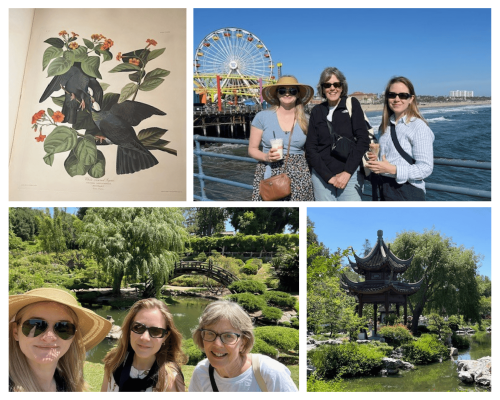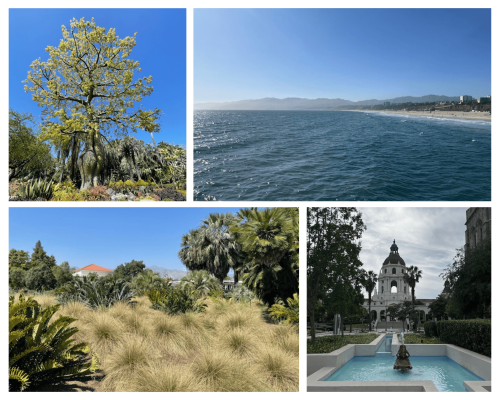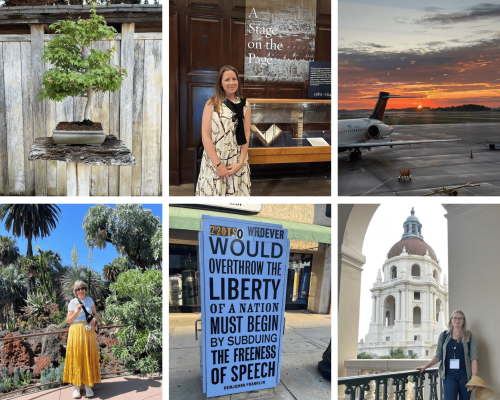Amanda, Elizabeth, and Joy @ LOEX 2025 – Pasadena, California
Opening Keynote (All)
This year’s opening keynote was Allison J. Head from Project Information Literacy. Her presentation reflected on the close to 15~ years of Project Information Literacy research projects, looking for common themes among the findings, even as technology has rapidly changed. Head described three major commonalities in student attitudes about research across all PIL research:
- Getting started is the most difficult part of research. This includes task definition, choosing a definition that meets the instructor’s expectations, and fear of choosing a topic that doesn’t work out.
- Students use strategies that are driven by familiarity and efficiency. Students are risk averse when it comes to research. They want sources that are current, convenient, and credible.
- Evaluation is habitual and students rely on social cues that librarians may miss in source evaluation instruction. Students tend to comment on elements like tone and trustworthiness, and rely on social networks (both digital and interpersonal) to evaluate sources.

Methodological Belief (Elizabeth)
Kate Wimer at George Fox University, a Quaker institution, presented on “The Lost Art of Skilled Belief: Rebalancing Our Approach to Information Literacy.” This is a continuation of her previous work on hypercritical student researchers, credulity, and constructive source evaluation instruction. An interesting aside is that both Wimer and keynote speaker Alison Head claimed that students tend to apply blanket trust to library sources, at least for research assignments. For this presentation, Wimer drew heavily on the work of English Professor Peter Elbow who advocated for a shift from methodological doubt to methodological belief in teaching critical thinking. Basically, it’s easy to critique and doubt but strong critical thinkers can learn to acknowledge and even imagine a perspective that isn’t real to them. Wimer used games and reflection questions to illustrate this process and provide an easily adaptable tool for instructors considering incorporating this into their teaching. For example, one exercise included answering fantastical questions like, “If humans lived underwater instead of on land, what would be different?” and sharing responses with the group. This was called “The Wonder Game” and encouraged participants to “Notice that most of these situations are fundamentally not true… but you can still have a conversation about the question.” In this way of thinking, both belief and doubt can be used as a dialectic to move understanding forward. Rather than relying on quick heuristics and straightforward answers, this approach to information literacy requires paying attention to the affective, emotional nature of research and discovery and how they interact with our belief systems. Wimer acknowledged that at her religious institution there were already attitudes and pathways in place to enable this kind of instruction with students, and suggested that at more secular institutions this could be discussed as “authenticity” and a way to more holistically exercise your mind to get buy-in from students. This was a thought-provoking session that attendees discussed for the duration of the conference!
Credit Courses (Amanda)
Angie Cox and Amandajean Nolte from the University of Northern Iowa presented on their credit bearing program, which like ours, includes classes that explore content beyond what’s taught in LIB100. UNI’s courses include Library 1100: AI, Algorithms, and Your Future and Library 2100, Who’s Controlling Your Information: Access, Authority, and Technology. They spent most of their time discussing Library 2100, which is similar in content to our Critical Information Literacy course. They were generous in sharing their learning outcomes, week by week schedule, journal prompts and readings.
All of us also attended Shannon Simpson’s, “Sex, Drugs, and Guns: Original Applications for Teaching Information Literacy Courses and One Shots, Using Black Feminisms and Radical Frames.” This presentation asked the audience to consider other frameworks – outside of the ACRL Framework – in which to root our instruction. These frameworks included Black feminism, design justice, Critical Race Theory, Queer Theory, Social Constructivism, and others.

AI Literacy in Library Instruction (Joy)
In this breakout session, Stephanie Ward from the University of Northern Colorado talked about the importance of integrating AI literacy in library instruction. She began with several interesting statistics from an August 2024 report published by the Digital Education Council. Here are two examples: 86% of students are using AI in their studies, and 69% use it to search for information. According to Linked In, AI Literacy is the #1 fastest-growing skill employers are looking for in the United states. What is AI Literacy? Long and Magerko in 2020, defined it as: “A set of competencies that enables individuals to critically evaluate AI technologies; communicate and collaborate effectively with AI; and use AI as a tool online, at home, and in the workplace.” For those familiar with ACRL’s Framework for Information Literacy, here’s an article about how ChatGPT fits in the Framework for Information Literacy. Ward also introduced the AI Literacy Frames developed by instruction librarians Hervieux and Wheatley which Hervieux and Wheatley talked about in their own breakout session (see next section). Ward also introduced a few other frameworks, including this one by Hibbert, et al at Barnard College. Here are a few things to address in the classroom regarding Artificial Intelligence: Basics, Parameters, Ethics (Intellectual Property, Copyright, Bias, Hallucinations, etc.), Using AI, and Evaluating AI. Here is a link to the presentation slides that include strategies for use in the classroom.
Using an AI Literacy Framework to Create an Instruction Session (Joy)
It is always a delight to get to meet library instruction rock stars at LOEX, so it was particularly fun to attend Sandy Hervieux and Amanda Wheatley’s (McGill University) session. Stephanie Ward cited their work in her AI Literacy session (see previous section). The six AI Literacy Frames which Hervieus and Wheatley developed are: 1) Know the basic principles of AI; 2) Understand the fundamental differences of AI Types; 3) Experiment with AI Tools; 4) Review the outputs and outcomes of AI Tools; 5) Evaluate the impact of AI on a societal scale; 6) Engage with AI discourse. At the end of the presentation they provided a link to their handouts and slides. This presentation is a perfect example of why it is worth traveling to Pasadena, California for a LOEX Conference!
Building Better One-Shots: Practical Approaches with Small Teaching (Joy)
This session by Emily Bush, Romona Romero, and Rachel Lane Walden of Vanderbilt University was based on James Lang’s book Small Teaching: Everyday Lessons in the Science of Learning. It was a privilege to hear James Lang speak at the April 29 WFU Teacher-Scholar Forum Supporting Student Attention. The presenters organized their workshop around the main sections of the book: 1) Knowledge; 2) Understanding; 3) Inspiration. Here are a few ideas for instruction sessions: Include low-stakes quizzes (practice remembering); Give open-ended quizzes; Review material from the week before; Connect to what they already know; Use mind maps or question prompts; Have them give examples and analogies; Value student assets; Name good work; Provide high structure; Share your enthusiasm.

Huntington Library, Art Museum, and Botanical Garden (All)
If you are enjoying the photos in this post, almost all of them came from our big outing – a tour of the Huntington Library, Art Museum, and Botanical Garden! We saw a Shakespeare First Folio! A Gutenberg Bible! Early copies of Chaucer, Audubon, and more! And of course, cacti, and palms, and roses for days.
Final Thoughts (All)
On our lengthy (lengthy) trip home, we discussed what we might consider our top takeaways and themes from LOEX. We all reflected that it must be difficult to put on a conference that hits the right notes when we are all, as one presenter put it, “living in a moment.” The last decade or so of instruction librarianship has been marked by a series of both national, global, and technological changes necessitating both energetic mobilization and near-constant professional re-skilling — and it seemed to us, at least, that the tenor of the conference reflected a culmination of these years of exhaustion. At several points, the energy was low and the vibes were off. But, there were also moments of determination and resilience, even as they sat together in uncomfortable company with resignation and defeat. Speakers were oft to end a session in quotes, here is a quick sampling:
- “I wish it need not have happened in my time,” said Frodo. “So do I,” said Gandalf, “and so do all who live to see such times. But that is not for them to decide. All we have to do is decide is what to do with the time that is given to us.” – J.R.R. Tolkein
- “I have been in Sorrow’s kitchen and licked out all the pots. Then I have stood on the peaky mountain wrapped in rainbows, with a harp and a sword in my hands” – Zora Neale Hurston
- “You have to act as if it were possible to radically transform the world. And you have to do it all the time.” – Angela Davis
Further Reading
- Elbow, Peter. The Believing Game or Methodological Believing
- Hervieux, Sandy, and Wheatley, Amanda. Building an AI Literacy Framework: Perspectives from Instruction Librarians
- Lang, James Small Teaching: Everyday Lessons in the Science of Learning
- Project Information Literacy. The Project Information Literacy Retrospective



3 Comments on ‘Amanda, Elizabeth, and Joy at LOEX 2025’
I look forward to the LOEX post each year because I feel like it gives me a glimpse into a part of library work that is less familiar to me. Thank you all for thoughtfully sharing the highlights!
Reading this post the #FOMO is REAL! I jotted down several notes and ideas, have many tabs open, and felt a little teary reading that LOTR quote – great post y’all! Thanks for sharing.
What an incredible experience! I learned so much from your post and have a lot of slides and articles to review. Thanks for participating and sharing your takeaways!